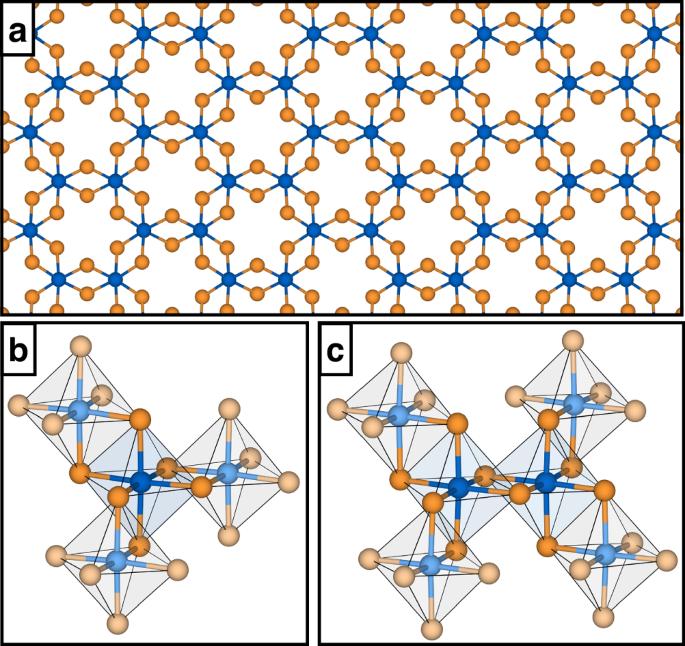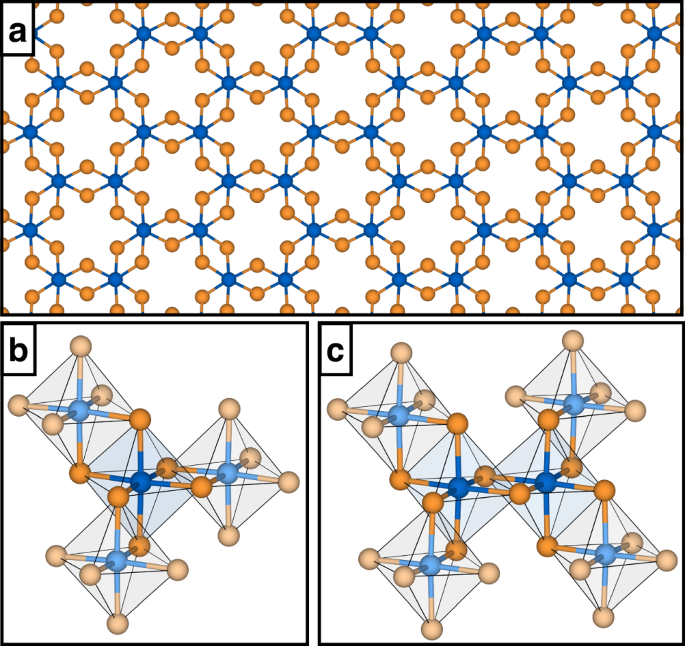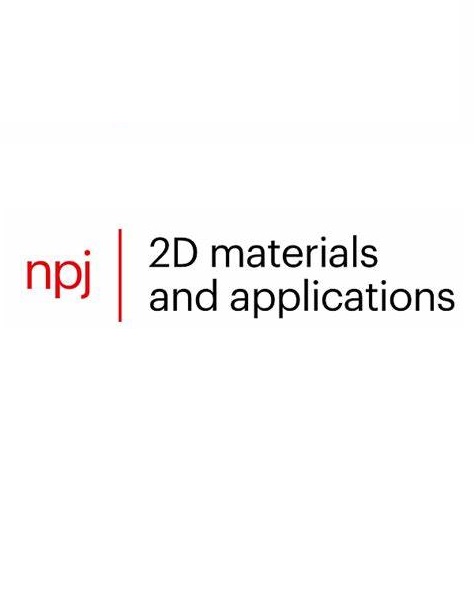从嵌入多体波函数看三卤化铬中的电子激发和自旋相互作用
IF 8.8
2区 材料科学
Q1 MATERIALS SCIENCE, MULTIDISCIPLINARY
引用次数: 0
摘要
尽管三卤化铬被广泛认为是一类很有希望用于下一代设备的二维磁体,但要准确描述它们的电子结构和磁性相互作用却很难实现。在这里,我们利用嵌入式多体波函数计算和完全广义的自旋哈密顿,量化了 CrX3(X = Cl、Br、I)的电子激发和自旋相互作用。我们发现,这三种三卤化物具有相似的 d 壳激发,由位于第一激发态 4T2 ($${t}_{2g}^{2}{e}_{g}^{0}$$)下方 1.5-1.7 eV 的高自旋 4A2 $$({t}_{2g}^{3}{e}_{g}^{0})$$ 基态组成。CrCl3 的单离子各向异性为 Asia = - 0.02 meV,而 Cr 的自旋-3/2 矩则通过 J1 = - 0.97 meV 和 J2 = - 0.05 meV 的双线性和双四性交换相互作用进行铁磁耦合。CrBr3 和 CrI3 的单离子各向异性相应值分别增至 Asia = -0.08 meV 和 Asia= - 0.12 meV,交换耦合分别增至 J1 = -1.21 meV, J2 = -0.05 meV 和 J1 = -1.38 meV, J2 = -0.06 meV。我们发现,由于磁偶极子-偶极子相互作用,Asia 和 Adip 之间的相互作用决定了整体磁各向异性,这种相互作用有利于铁磁单层和块状层状磁体中磁矩的面内取向。这两种贡献之间的竞争使得 CrCl3 和 CrI3 分别成为易面(Asia + Adip >0)和易轴(Asia + Adip <0)铁磁体。磁体之间的差异可追溯到卤素配体的原子半径和自旋轨道耦合的大小。我们的研究结果与最近的实验结果非常吻合,从而为三卤化铬中的基本相互作用提供了参考值。本文章由计算机程序翻译,如有差异,请以英文原文为准。


Electronic excitations and spin interactions in chromium trihalides from embedded many-body wavefunctions
Although chromium trihalides are widely regarded as a promising class of two-dimensional magnets for next-generation devices, an accurate description of their electronic structure and magnetic interactions has proven challenging to achieve. Here, we quantify electronic excitations and spin interactions in CrX3 (X = Cl, Br, I) using embedded many-body wavefunction calculations and fully generalized spin Hamiltonians. We find that the three trihalides feature comparable d-shell excitations, consisting of a high-spin 4A2 $$({t}_{2g}^{3}{e}_{g}^{0})$$ ground state lying 1.5–1.7 eV below the first excited state 4T2 ( $${t}_{2g}^{2}{e}_{g}^{1}$$ ). CrCl3 exhibits a single-ion anisotropy Asia = − 0.02 meV, while the Cr spin-3/2 moments are ferromagnetically coupled through bilinear and biquadratic exchange interactions of J1 = − 0.97 meV and J2 = − 0.05 meV, respectively. The corresponding values for CrBr3 and CrI3 increase to Asia = −0.08 meV and Asia= − 0.12 meV for the single-ion anisotropy, J1 = −1.21 meV, J2 = −0.05 meV and J1 = −1.38 meV, J2 = −0.06 meV for the exchange couplings, respectively. We find that the overall magnetic anisotropy is defined by the interplay between Asia and Adip due to magnetic dipole–dipole interaction that favors in-plane orientation of magnetic moments in ferromagnetic monolayers and bulk layered magnets. The competition between the two contributions sets CrCl3 and CrI3 as the easy-plane (Asia + Adip >0) and easy-axis (Asia + Adip <0) ferromagnets, respectively. The differences between the magnets trace back to the atomic radii of the halogen ligands and the magnitude of spin–orbit coupling. Our findings are in excellent agreement with recent experiments, thus providing reference values for the fundamental interactions in chromium trihalides.
求助全文
通过发布文献求助,成功后即可免费获取论文全文。
去求助
来源期刊

npj 2D Materials and Applications
Engineering-Mechanics of Materials
CiteScore
14.50
自引率
2.10%
发文量
80
审稿时长
15 weeks
期刊介绍:
npj 2D Materials and Applications publishes papers on the fundamental behavior, synthesis, properties and applications of existing and emerging 2D materials. By selecting papers with the potential for impact, the journal aims to facilitate the transfer of the research of 2D materials into wide-ranging applications.
 求助内容:
求助内容: 应助结果提醒方式:
应助结果提醒方式:


